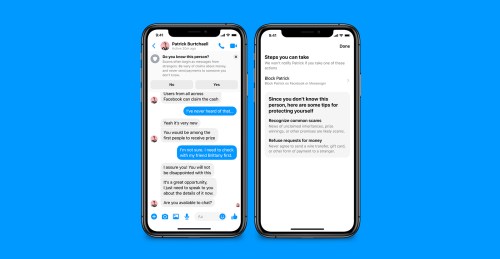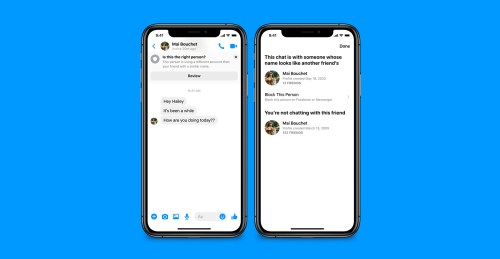Preventing Unwanted Contacts and Scams in Messenger

Privacy, safety and security are fundamental to Messenger. We work hard to ensure Messenger is a safe place to connect with the people who matter most while also protecting their privacy (learn more), and today, I’m excited to announce a new safety feature that will help millions of people avoid potentially harmful interactions and possible scams without compromising their privacy.
Building Safety into Private Spaces
Our strategy to keep people safe on Messenger focuses not only on giving them the information and controls they need to prevent abuse from happening, but also on detecting it and responding quickly if it occurs. We’re introducing safety notices in Messenger that will pop up in a chat and provide tips to help people spot suspicious activity and take action to block or ignore someone when something doesn’t seem right. We started rolling this feature out on Android in March and will bring this to more people around the world on iOS next week.

As we move to end-to-end encryption, we are investing in privacy-preserving tools like this to keep people safe without accessing message content. We developed these safety tips with machine learning that looks at behavioral signals like an adult sending a large amount of friend or message requests to people under 18. This ensures that the new features will be available and effective when Messenger is end-to-end encrypted.
Helping Minors Stay Safe
Keeping minors safe on our platforms is one of our greatest responsibilities. Messenger already has special protections in place for minors that limit contact from adults they aren’t connected to, and we use machine learning to detect and disable the accounts of adults who are engaging in inappropriate interactions with children. Our new feature educates people under the age of 18 to be cautious when interacting with an adult they may not know and empowers them to take action before responding to a message.
We are always consulting with experts on the best ways to keep minors safe and we’re encouraged when they express confidence in safety features like this.
“These features show a great integration of the technical tools that will help curb bad behavior on the platform, while also reminding people of their own control over their account,” said Stephen Balkam, CEO of the Family Online Safety Institute. “It’s important to use language that empowers people to make wise decisions and think more critically about who they’re interacting with online. We’re especially glad to see this reflected in the thoughtful approach around safety considerations for younger users.” (The Family Online Safety Institute (FOSI) is a nonprofit internet safety organization that receives support from Facebook and other tech companies. FOSI also serves as a member of Facebook’s Safety Advisory Board and receives an honorarium in appreciation of their time and expertise.)
Avoiding Scams and Imposters
Too often people interact with someone online they think they know or trust, when it’s really a scammer or imposter. These accounts can be hard to identify at first and the results can be costly. Messenger already filters some potential spam or malware and offers tips to avoid common scams. Our new safety notices also help educate people on ways to spot scams or imposters and help them take action to prevent a costly interaction.

We designed this safety feature to work with full encryption. People should be able to communicate securely and privately with friends and loved ones without anyone listening to or monitoring their conversations. As Messenger becomes end-to-end encrypted by default, we will continue to build innovative features that deliver on safety while leading on privacy. These safety notices will help people avoid potentially harmful interactions and possible scams while empowering them with the information and controls needed to keep their chats private, safe and secure.
